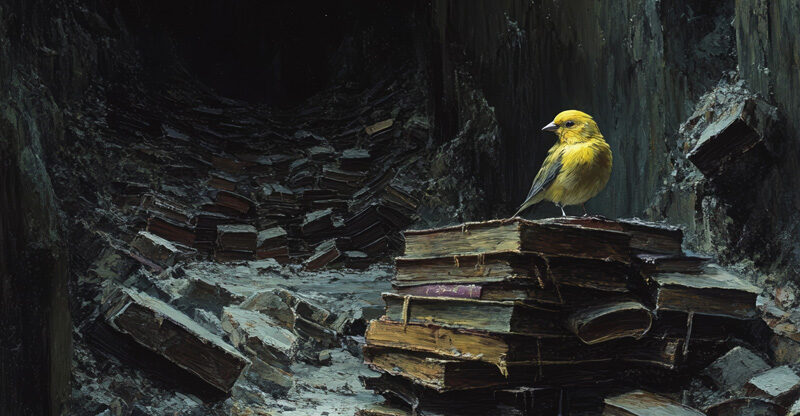A Canary in the Coal Mine
In many ways, publishers that dare to produce books challenging powerful people and institutions are akin to the “canary in the coal mine,” warning of the dangers that come with encroaching authoritarianism. The expression finds its origins in mining, where canaries were used to detect toxic gases, sacrificing their lives to alert miners to unseen threats. Similarly, independent publishers and the Free Press often serve as society’s early warning system, exposing uncomfortable truths and questioning authority. In a government veering toward totalitarianism, these publishers are likely to be among the first casualties, as oppressive regimes cannot tolerate a truly Free Press that questions or undermines their legitimacy.
In a society moving toward absolute power, maintaining the illusion of consensus and control becomes paramount. Dissenting voices, particularly those equipped with facts, research, and firsthand accounts, pose a significant threat to this façade. Publishers willing to confront powerful institutions directly undermine the myth of the infallible state. They present documented evidence of corruption, hypocrisy, and failures of leadership, eroding the state’s capacity to control the narrative and sowing seeds of skepticism in the public mind. By shedding light on hidden truths, these publishers empower citizens with knowledge—an act that totalitarian regimes view as subversive, as an informed public is less susceptible to propaganda and manipulation.
Moreover, independent publishers represent a foundation of democracy and freedom, as they amplify voices that might otherwise be silenced. These publishers do not simply report the news; they document history and provide critical analyses of societal problems and power structures. The very act of publishing controversial or investigative works embodies freedom of expression, a fundamental right that totalitarian systems are inherently opposed to because it challenges the absolute authority they seek to establish. By silencing these publishers, an authoritarian regime aims to close off avenues for dissent, creating a climate of fear and self-censorship that deters others from speaking out.
When powerful entities and institutions begin to tighten their grip, publishers that confront them are often the first targets, forced into compliance or obliterated entirely. Their “expiration” signals a broader assault on freedoms, alerting society to the erosion of democratic rights. By resisting, these publishers carry the burden of exposing society to the truth. Their disappearance foreshadows the loss of freedom for everyone. The survival of a Free Press is essential to safeguard democratic principles, and their loss is a powerful warning that a society has drifted into the dark mine of tyranny, where only silence prevails.









